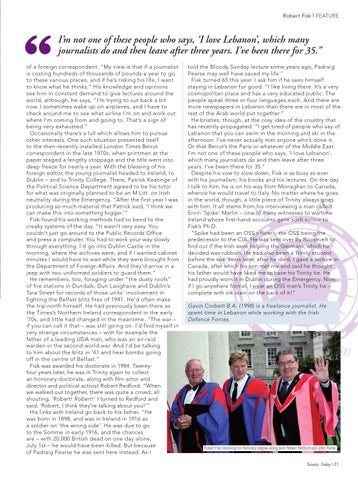Robert Fisk | FEATURE
I’m not one of these people who says, ‘I love Lebanon’, which many journalists do and then leave after three years. I’ve been there for 35.” of a foreign correspondent. “My view is that if a journalist is costing hundreds of thousands of pounds a year to go to these various places, and if he’s risking his life, I want to know what he thinks.” His knowledge and opinions see him in constant demand to give lectures around the world, although, he says, “I’m trying to cut back a bit now. I sometimes wake up on airplanes, and I have to check around me to see what airline I’m on and work out where I’m coming from and going to. That’s a sign of being very exhausted.” Occasionally there’s a lull which allows him to pursue other interests. One such situation presented itself to the then-recently installed London Times Beirut correspondent in the late 1970s, when printmen at the paper staged a lengthy stoppage and the title went into deep freeze for nearly a year. With the blessing of his foreign editor, the young journalist headed to Ireland, to Dublin – and to Trinity College. There, Patrick Keatinge of the Political Science Department agreed to be his tutor for what was originally planned to be an M.Litt. on Irish neutrality during the Emergency. “After the first year I was producing so much material that Patrick said, ‘I think we can make this into something bigger.’” Fisk found his working methods had to bend to the creaky systems of the day. “It wasn’t very easy. You couldn’t just go around to the Public Records Office and press a computer. You had to work your way slowly through everything. I’d go into Dublin Castle in the morning, where the archives were, and if I wanted cabinet minutes I would have to wait while they were brought from the Department of Foreign Affairs. And they’d arrive in a jeep with two uniformed soldiers to guard them.” He remembers, too, foraging under “the dusty roofs” of fire stations in Dundalk, Dun Laoghaire and Dublin’s Tara Street for records of those units’ involvement in fighting the Belfast blitz fires of 1941. He’d often make the trip north himself. He had previously been there as the Times’s Northern Ireland correspondent in the early ’70s, and little had changed in the meantime. “The war – if you can call it that – was still going on. I’d find myself in very strange circumstances – with for example the father of a leading UDA man, who was an air-raid warden in the second world war. And I’d be talking to him about the blitz in ’41 and hear bombs going off in the centre of Belfast.” Fisk was awarded his doctorate in 1984. Twentyfour years later, he was in Trinity again to collect an honorary doctorate, along with film actor and director and political activist Robert Redford. “When we walked out together, there was quite a crowd, all shouting, ‘Robert! Robert!’ I turned to Redford and said, ‘Robert, I think they’re talking about you!’” His links with Ireland go back to his father. “He was born in 1898, and was in Ireland in 1916 as a soldier on ‘the wrong side’. He was due to go to the Somme in early 1916, and the chances are – with 20,000 British dead on one day alone, July 1st – he would have been killed. But because of Padraig Pearse he was sent here instead. As I
told the Bloody Sunday lecture some years ago, Padraig Pearse may well have saved my life.” Fisk turned 65 this year. I ask him if he sees himself staying in Lebanon for good. “I like living there. It’s a very cosmopolitan place and has a very educated public. The people speak three or four languages each. And there are more newspapers in Lebanon than there are in most of the rest of the Arab world put together.” He bristles, though, at the cosy idea of the country that has recently propagated. “I get tired of people who say of Lebanon that you can swim in the morning and ski in the afternoon. I’ve never actually met anyone who’s done it. Or that Beirut’s the Paris or whatever of the Middle East. I’m not one of these people who says, ‘I love Lebanon’, which many journalists do and then leave after three years. I’ve been there for 35.” Despite his vow to slow down, Fisk is as busy as ever with his journalism, his books and his lectures. On the day I talk to him, he is on his way from Monaghan to Canada, whence he would travel to Italy. No matter where he goes in the world, though, a little piece of Trinity always goes with him. It all stems from his interviewing a man called Ervin ‘Spike’ Marlin – one of many witnesses to wartime Ireland whose first-hand accounts gave such colour to Fisk’s Ph.D. “Spike had been an OSS officer – the OSS being the predecessor to the CIA. He was sent over by Roosevelt to find out if the Irish were helping the Germans, which he decided was rubbish. He had also been a Trinity student before the war. Years later, after he died, I gave a lecture in Canada, after which his son met me and said he thought his father would have liked me to have his Trinity tie. He had proudly worn it in Dublin during the Emergency. Now, if I go anywhere formal, I wear an OSS man’s Trinity tie – complete with ink stain on the back of it!” Gavin Corbett B.A. (1998) is a freelance journalist. He spent time in Lebanon while working with the Irish Defence Forces.
Robert Fisk receiving his honorary degree along with Robert Redford and John Hume.
Trinity Today | 31
TrinityToday2011.indd 31
09/09/2011 09:59:03
